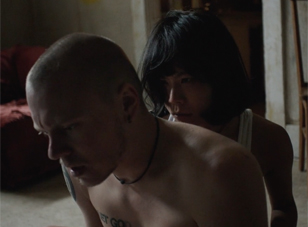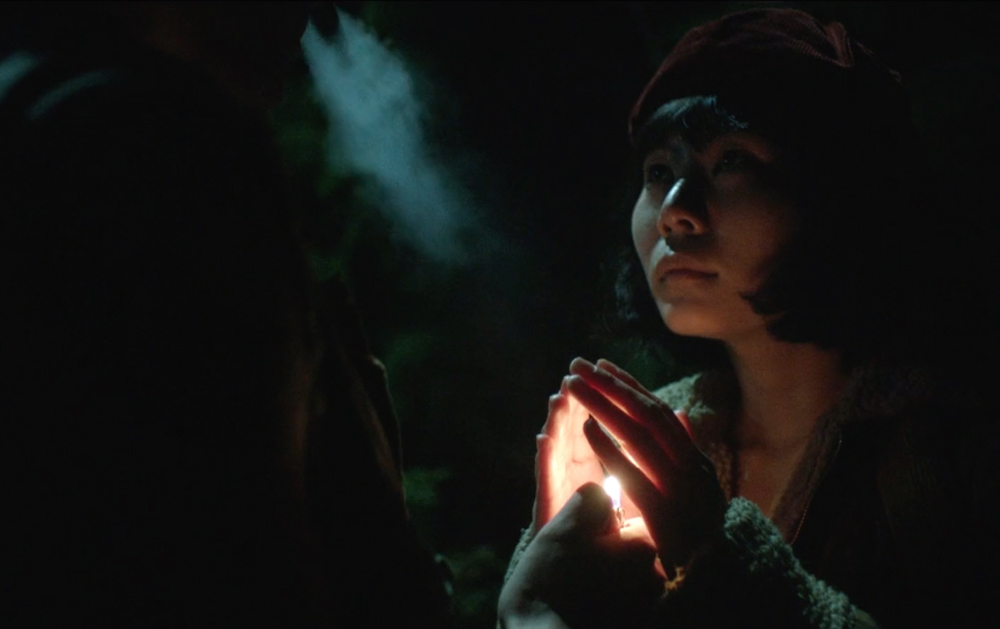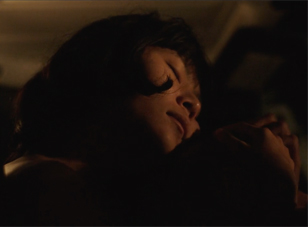In “Baby Don’t Cry,” you’re given something to hold onto in the form of a title card to let you know what you’re watching is a true story, though you’re invited to take notice of its intwined threads. When its writer and star Zita Bai couldn’t have believed anything that was happening to her as she acclimated to a new life in America after growing up in China, the film doesn’t hide a variety of collisions both in front of and behind the camera to properly chronicle the disorienting experience as well as the unique connections that one ends up making to get by, wasting no time in noting the unusual dynamic of its creative team with director Jesse Dvorak and creative producer Qiyu Zhou as they carry titles of equal weight, introducing snippets of surreptitiously shot high-eight footage into a more polished digital presentation and gradually revealing the intersection of Bai’s confusion as both an immigrant and a 17-year-old coming into womanhood, having no guidance on how to navigate the world as either with a deceased father and a mother (Helen Sun) too wrapped up in her own bitterness.
Things open up to some degree with the arrival of Fox (Vasily Provatakis), who is as rascally as his name suggests — the two’s meet cute involves him robbing her of her camera — and although the past weighs on both as heavily as the Seattle sky above them, the two find their shared pain bonding enough to hit the road together, both believing no one will miss them. In fact, Bai and Provatakis make their mark as Baby and Fox, who start to look a little like Bonnie and Clyde as they make trouble around the Pacific Northwest, seemingly blissfully unaware in their youth of how dangerous their journey is when there’s a playful innocence to it all. Searching to model their behavior after others, the couple has only one another to look towards, not exactly having the best instincts to begin with and the film expresses not only what it’s like to grow up fast, but when it hardly happens in a straight line, picking up an education from the most unlikely of places and overcoming fears that turn monumental in one’s head. Both the cast and crew of “Baby Don’t Cry” never appear daunted by such an undertaking, boldly venturing out to everywhere the film needs to go geographically and emotionally and with its premiere this week at Fantasia Fest, Bai, Zhou and Provatakis spoke about building the trust to show such vulnerability, how the locations influenced the film’s feel and how this is only the start.
Zita Bai: I was born and raised in China and moved to America as a young teen. I didn’t speak a word of English and I never had really seen coming-of-age stories about immigrants who are trying to navigate who they are, so I just wanted to tell a story that wants to represent that. In the end, it also comes down to who’s the best person I trust to tell the story and previously, I produced Jesse’s first feature film and had a pleasure of working with him on set, he’s so calm and he knows how to work under stress, so when I finish the script, I thought about him.
Qiyu, you have a unique title of “creative producer” on this – how did you come aboard?
Qiyu Zhou: When Zita brought me the script, I felt there’s never an Asian character seen this way, so I really, really wanted to do it and she already finished a quite solid draft. I thought this was super visceral and super, super brave, and my major was in directing, but I felt if I can be the creative producer for this one, we should just go ahead and do it.
Vas, what attracted you to this?
Vas Provatakis: I auditioned for it, like the hundreds of other actors, but when I saw the sides that they sent me, I felt this automatic connection to the character. I was already formulating ideas of how I would portray him and during the auction process, Jesse and Zita were all super-open to improvisation and letting me explore and find it. I really, really appreciated and benefitted from that, so through the whole process, I felt like we were finding the characters together, which was really cool.
Zita Bai: Having Vas in our cast was one of the luckiest things that happened. We did a couple of chemistry tests and [when Vas and I] were sitting there, having regular conversations, Jesse told me we made sense together. We were just Baby and Fox.
Vas Provatakis: Yeah, Zita is an extremely generous actor to work with and she [invited me to] enter the space as a character and really try new things, but also I think there’s a certain amount of “fuck it” that both Zita and I have, which allows us to go into a scene and just try new things and see what works. Ideally, the challenges you feel working on a film should all be internal – I felt like [everyone in the production] were all were rooting for me the whole time and with everyone doing such a great job and Zita and everybody working their ass off, it would make me want to be on the same level as them.
Zita Bai: Vas allowed myself to be open, honest and then we developed those characters together.
For a film of this intimate scale, there are a lot of locations. What was it like?
Qiyu Zhou: Shooting in Seattle definitely helped a lot because when we were going for a location scout there and I pitched to them, “Hey, I love your location – it’s a really beautiful restaurant. Can I have it in a movie? They would be really excited. Different from L.A. [where] if you mention a movie, they think about cash immediately. In Seattle, they were more chill and laid back, so it’s a lot easier and it was good for the story because it’s very gloomy and also very humid, fitting the emotional nature of the two characters.
Zita Bai: The environment and the lighting choices really helped me as a character to understand where I was in that time frame because sometimes me and Vas would just go into total darkness and that’s how I envisioned the characters going through it emotionally.
Vas Provatakis: And it was cold when we were there up in Seattle in the middle of October through the beginning of November, but having that cold was actually useful because amongst the cold, it was me and her and we had to warm each other and be in it together. It makes you focus for sure.
Qiyu Zhou: If you remember in the movie, they’re wearing shorts and T-shirts.

Vas Provatakis: Funny enough, that to me was the coldest day of production because it was in the dead of night and it was freezing. Between takes when they would call cut, I would shrivel up and I had to wear this cut-off army jacket. That’s the day I think of that’s like, “Oh my God.”
Zita Bai: Yeah, thanks to Vas’ dedication, I feel like the environment prepped me to be that vulnerable and cold, emotional state.
The other scene that looked pretty wild was the scene in the Mexican restaurant. How did guacamole end up in Zita’s hair?
Zita Bai: Jesse and our team truly allowed me and Vas to be spontaneous and to be just young American kids, having a fun time, so we didn’t really care about the surroundings and we’re just being in the moment.
Qiyu Zhou: Yeah, the daylight was the thing we were trying to rush [to stay ahead of] a little bit for that day, but the result was great because of the improvisation and the chemistry between the two actors came out, especially when they improvised the chip-throwing.
Vas Provatakis: I think [before] the first take, someone told me to throw food at Zita…I don’t know if it was Jesse. [laughs] But on the first take, I took a hand full of salsa and I threw it at her and I remember…
Zita Bai: It was a good shot.
Vas Provatakis: It was good, but there was something with continuity where we had to go back and do the take again and she had salsa all over herself.
Qiyu Zhou: Right, that cost a lot of time, but the take was good.
Vas Provatakis: That’s why they’ll never hire me again. [laughs]
A lot of the surreptitious high-8 footage that shows the relationship, was that shot in between set-ups for the more traditional film?
Zita Bai: Yeah, I shot most of the high-8 footage, especially the dating scenes with Vas, we just went to the Seattle’s Pike Place and spent the whole day there [filming].
Zita, when you’re involved as much as you are during the writing and acting, is it difficult to be in the edit when you could be self-conscious or does it make it easier?
Zita Bai: That’s why I had Zeron [Zhao, the other producer] and Qiyu with me because we spent six months in the editing room, going through each cut and whenever I had this insecurity about is this the right emotion? She would come in and make the judgment, so it was a collaboration. I’m glad it happened.
Qiyu Zhou: And to be honest, each take of acting was good. It’s more about selecting the pacing.
Zita Bai: [That was important because] when I first moved to the States, I was very young and I think this was true to everyone, your coming-of-age years just happen so fast. I’m very thankful for “Baby Don’t Cry” allowing me a second chance to reflect on my past.
What’s it like getting it out into the world?
Vas Provatakis: Personally, it’s been an honor to be able to work with them on this one and the most exciting thing for me is that I know Zita has loved this film festival for a while and it’s been her dream, so it’s really cool seeing your friends get to where they want to be and I’m just very exciting to see what they do next.
Qiyu Zhou: It’s exciting and crazy because Zita and I are also working on two other project – one is a slasher film and the other one is a wu xia western that she’s going to be the writer and I’ll be directing it, so hopefully she’ll play the [lead]. I wish that these two movies can carry on the spirit that “Baby Don’t Cry” has and keep going with female-driven genre films.
Zita Bai: We have to hop from project to project and I feel like that’s just the life of a filmmaker. In the end, one thing I love about filmmaking is that it makes things timeless because it doesn’t matter how old you are. You can go back in time and look at yourself as a 20-year-old, a 16-year-old, as a 30-year-old, so I’m very grateful for filmmaking.
Qiyu Zhou: And also teamwork — I feel like if a group of people are fighting together for one thing, they feel united and I feel that’s how the world should be.
“Baby Don’t Cry” will screen virtually at Fantasia Fest on August 13th beginning at 9 am EST.





